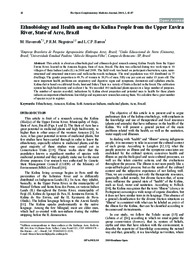Ethnobiology and health among the Kulina People from the Upper Envira River, State of Acre, Brazil.
Ethnobiology and health among the Kulina People from the Upper Envira River, State of Acre, Brazil.
Autoria: HAVERROTH, M.; NEGREIROS, P. R. M.; BARROS, L. C. P.
Resumo: This article is about an ethnobiological and ethnoecological research among Kulina People from the Upper Envira River, located in the Amazon Region, State of Acre, Brazil. The data was collected during two work trips to 10 villages of three Indian Lands (IL) in 2008 and 2009. The field work was based on participant observation, open, semi-structured and structured interviews and walk-in-the-woods technique. The total population was 423 distributed in 77 dwellings. The gender proportion is 49,7% of women to 50,3% of men. Fifty one per cent are under 15 years old. The most important health problems are respiratory and digestive signs and symptoms, dermatosis and ophidian attacks. Kulina diet is based on cultivated foods, hunt and fishes. There is a variety of fruits collected in the forest. The cultivation system has high biodiversity and is about 1 ha. We recorded 193 medicinal plants species to a large number of purposes. The number of species recorded, indications by Kulina about properties and potential uses to health for these plants indicate an important ethnobotanic knowledge and requires new researches among them. We calculate that a great number of species is yet to register.
Ano de publicação: 2010
Tipo de publicação: Artigo de periódico
Unidade: Embrapa Acre
Palavras-chave: Acre, Alto rio Envira, Amazonia Occidental, Amazônia Ocidental, Conhecimento tradicional, Conocimiento tradicional, Ethnobiology, Etnobiologia, Indigenous knowledge, Medicina tradicional, Medicinal plants, Pesquisa, Planta medicinal, Plantas medicinales, Traditional medicine, Western Amazon, Índios Kulina
Observações
1 - Por padrão são exibidas publicações dos últimos 20 anos. Para encontrar publicações mais antigas, configure o filtro ano de publicação, colocando o ano a partir do qual você deseja encontrar publicações. O filtro está na coluna da esquerda na busca acima.
2 - Para ler algumas publicações da Embrapa (apenas as que estão em formato ePub), é necessário ter, no celular ou computador, um desses softwares gratuitos. Sistemas Android: Google Play Livros; IOS: iBooks; Windows e Linux: software Calibre.
Acesse outras publicações
Acesse a Base de Dados da Pesquisa Agropecuária (BDPA) para consultar o acervo completo das bibliotecas da Embrapa.

